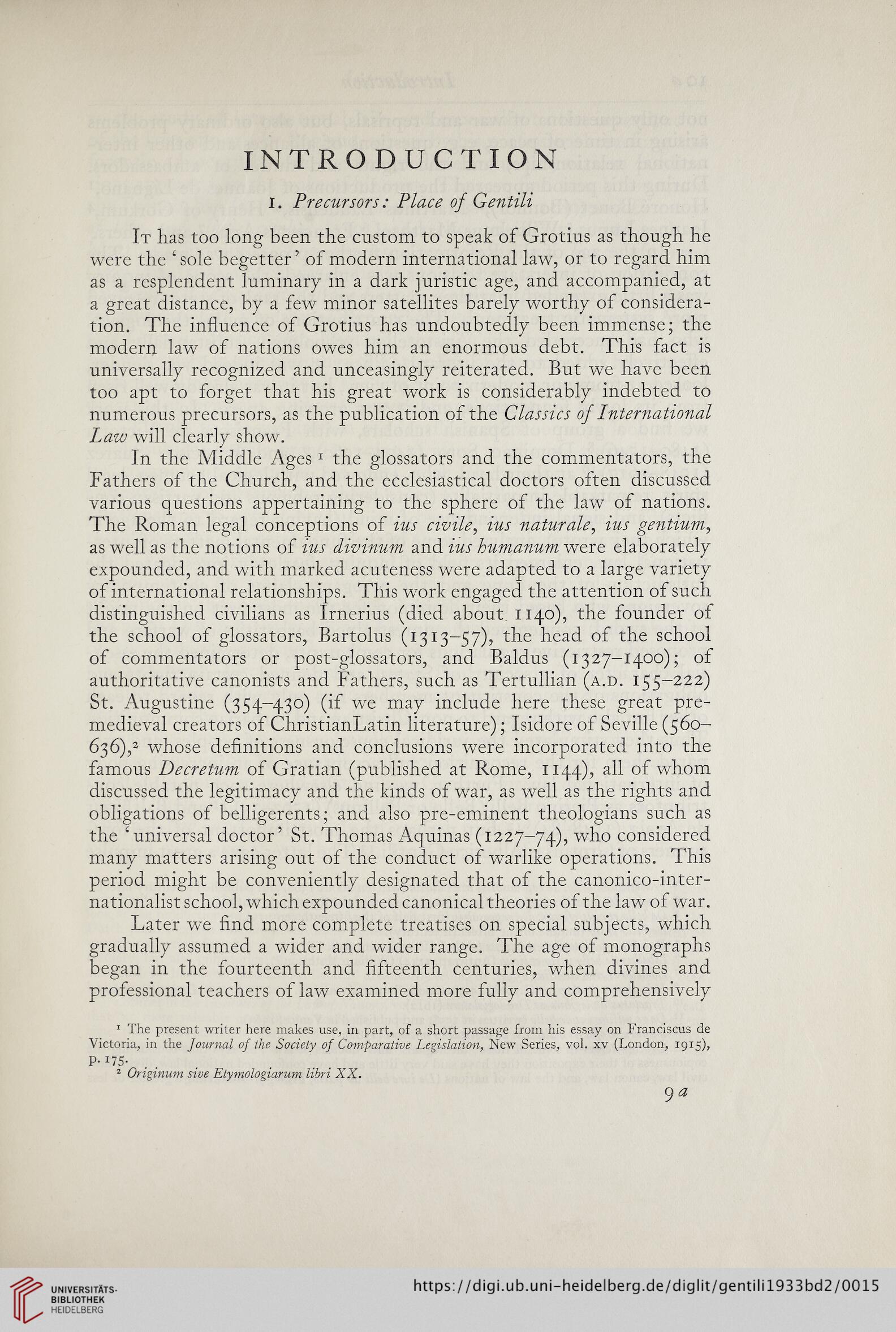INTRODUCTION
I. Precursors: Place of Gentili
It has too long been the custom to speak of Grotius as though he
were the 'sole begetter' of modern international law, or to regard him
as a resplendent luminary in a dark juristic age, and accompanied, at
a great distance, by a few minor satellites barely worthy of considera-
tion. The influence of Grotius has undoubtedly been immense; the
modern law of nations owes him an enormous debt. This fact is
universally recognized and unceasingly reiterated. But we have been
too apt to forget that his great work is considerably indebted to
numerous precursors, as the publication of the Classics of International
Law will clearly show.
In the Middle Ages 1 the glossators and the commentators, the
Fathers of the Church, and the ecclesiastical doctors often discussed
various questions appertaining to the sphere of the law of nations.
The Roman legal conceptions of ius civile, ins naturale, ius gentium,
as well as the notions of ius divinum and ius humanum were elaborately
expounded, and with marked acuteness were adapted to a large variety
of international relationships. This work engaged the attention of such
distinguished civilians as Irnerius (died about. 1140), the founder of
the school of glossators, Bartolus (1313-57), the head of the school
of commentators or post-glossators, and Baldus (1327-1400); of
authoritative canonists and Fathers, such as Tertullian (a.d. 155-222)
St. Augustine (354-430) (if we may include here these great pre-
medieval creators of ChristianLatin literature); Isidore of Seville (560-
636), whose definitions and conclusions were incorporated into the
famous Decretum of Gratian (published at Rome, 1144), all of whom
discussed the legitimacy and the kinds of war, as well as the rights and
obligations of belligerents; and also pre-eminent theologians such as
the 'universal doctor' St. Thomas Aquinas (1227-74), who considered
many matters arising out of the conduct of warlike operations. This
period might be conveniently designated that of the canonico-inter-
nationalist school, which expounded canonical theories of the law of war.
Later we find more complete treatises on special subjects, which
gradually assumed a wider and wider range. The age of monographs
began in the fourteenth and fifteenth centuries, when divines and
professional teachers of law examined more fully and comprehensively
1 The present writer here makes use, in part, of a short passage from his essay on Franciscus de
Victoria, in the Journal of the Society of Comparative Legislation, New Series, vol. xv (London, 1915),
2 Originurn sive Etymologiarum libri XX.
9 a
I. Precursors: Place of Gentili
It has too long been the custom to speak of Grotius as though he
were the 'sole begetter' of modern international law, or to regard him
as a resplendent luminary in a dark juristic age, and accompanied, at
a great distance, by a few minor satellites barely worthy of considera-
tion. The influence of Grotius has undoubtedly been immense; the
modern law of nations owes him an enormous debt. This fact is
universally recognized and unceasingly reiterated. But we have been
too apt to forget that his great work is considerably indebted to
numerous precursors, as the publication of the Classics of International
Law will clearly show.
In the Middle Ages 1 the glossators and the commentators, the
Fathers of the Church, and the ecclesiastical doctors often discussed
various questions appertaining to the sphere of the law of nations.
The Roman legal conceptions of ius civile, ins naturale, ius gentium,
as well as the notions of ius divinum and ius humanum were elaborately
expounded, and with marked acuteness were adapted to a large variety
of international relationships. This work engaged the attention of such
distinguished civilians as Irnerius (died about. 1140), the founder of
the school of glossators, Bartolus (1313-57), the head of the school
of commentators or post-glossators, and Baldus (1327-1400); of
authoritative canonists and Fathers, such as Tertullian (a.d. 155-222)
St. Augustine (354-430) (if we may include here these great pre-
medieval creators of ChristianLatin literature); Isidore of Seville (560-
636), whose definitions and conclusions were incorporated into the
famous Decretum of Gratian (published at Rome, 1144), all of whom
discussed the legitimacy and the kinds of war, as well as the rights and
obligations of belligerents; and also pre-eminent theologians such as
the 'universal doctor' St. Thomas Aquinas (1227-74), who considered
many matters arising out of the conduct of warlike operations. This
period might be conveniently designated that of the canonico-inter-
nationalist school, which expounded canonical theories of the law of war.
Later we find more complete treatises on special subjects, which
gradually assumed a wider and wider range. The age of monographs
began in the fourteenth and fifteenth centuries, when divines and
professional teachers of law examined more fully and comprehensively
1 The present writer here makes use, in part, of a short passage from his essay on Franciscus de
Victoria, in the Journal of the Society of Comparative Legislation, New Series, vol. xv (London, 1915),
2 Originurn sive Etymologiarum libri XX.
9 a




